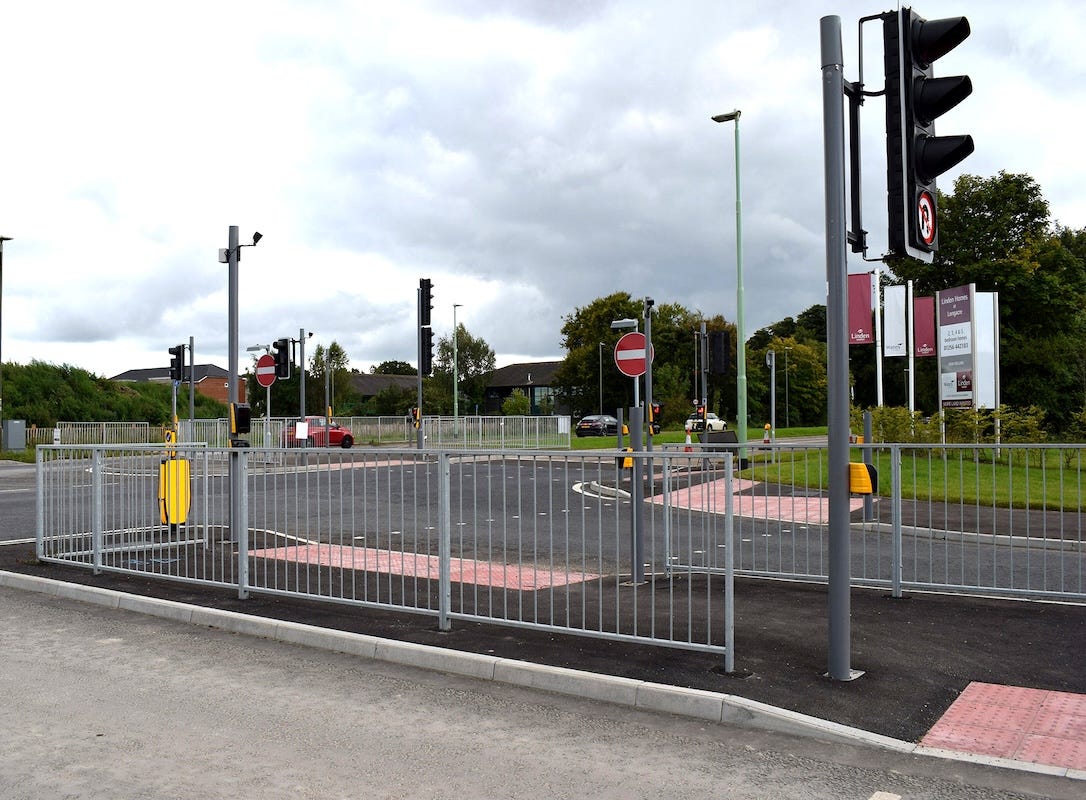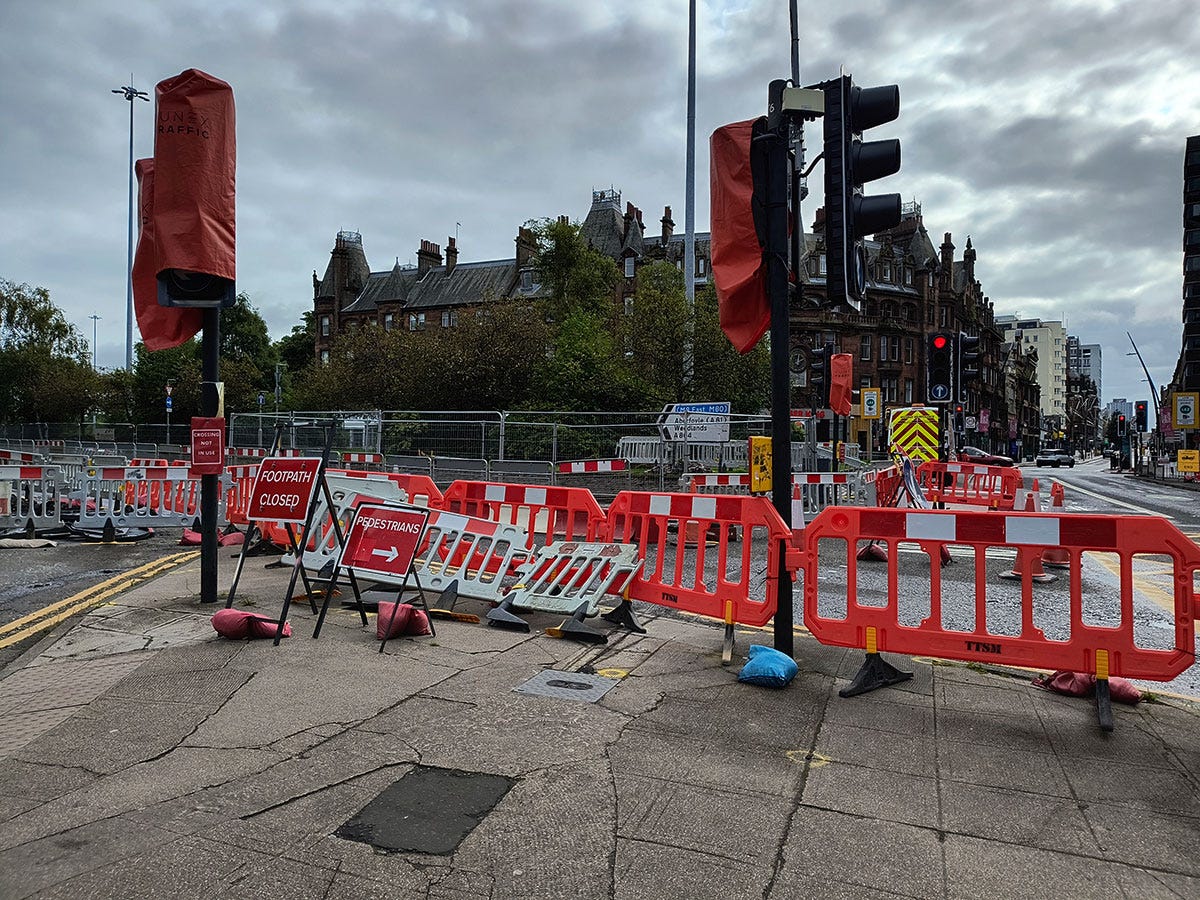The local council had erected a temporary fence to ensure hapless locals and tourists couldn’t get near the original wall, which they presumably viewed as dangerous.
The wall they are being protected from dates to the eleventh century. At some point authorities added the black metal thing to the top, presumably a cruder safety measure from earlier times.
Now they have added temporary fencing to keep people from even approaching the wall itself.
This annoying and unnecessary intrusion is increasingly commonplace in Britain. We see all sorts of things fenced off, our way barred by some local official.
A routine example is the forest of metal barriers erected at road junctions, forcing you into a kind of pre-planned maze to prevent you crossing the road where you decide. You cross the road where they decide.

Throw in traffic lights and other instruments of remote management and you often witness a confusion of controlling mechanisms that increasingly scar the urban landscape.
What is going on? Who decides this? And why? We never used to bother except for unusually dangerous things.
There is a palpable sense the officials think they are protecting us from ourselves. All this urban clutter is for our own good.
We cannot be trusted to cross the road without assistance and getting anywhere near that wall at Durham Cathedral will mean inevitable deaths and the aggravating paperwork that goes with it.
Previous generations had none of this. They handled danger through personal autonomy, making their own decisions based on some nominal risk analysis.
Now the state and its agents do this. They manage health and safety on our behalf. They ignore our autonomy in a bid to assuage their own concerns.
Fear, then, seems to drive much of this. More accurately, anxiety. An anxious mind on the lookout for danger; a mind that does not expect to manage hazards personally but requires external assistance.
These initiatives reflect a bureaucratic mindset. They provide insights into what animates them. Big metal fences and traffic calming measures control our world. They make it less uncontrolled, less chaotic.
To an anxious mind this is an improvement. It is reassuring.
These are the people destroying our world. Not bold visionaries, but often minor functionaries operating with the authority imposed by an inhuman machine that sometimes seems to be everywhere.
They particularly flourish in the public sector, although are increasingly seen in the big corporations too.
Someone will have conducted a health and safety assessment of Durham Cathedral and concluded it failed some arbitrary measure, perhaps a new regulation, despite standing for almost a thousand years.
This view, the long view, is absent from the calculation. It is their own anxiety being attended to.
Defacing a World Heritage site is irrelevant. Anxiety is intolerable. Self-control, reining in your emotions, or looking out for your own safety is no longer in vogue. Far easier to erect some fencing and be done with it. That solves the problem by preventing any action by anyone.
Our world is being destroyed in this way by local officials. It is them defacing our world, uglifying everything in an attempt make it safer and more aligned with their anxious mental state.

It is a blatant attempt to control an environment they fear because it is out there, unregulated and chaotic. It bears no relation to whatever perfect model sits in their mind.
The faceless bureaucrats who end up in these dark corners of the state can do much damage. Most of it is a gradual erosion of autonomy. We lose a little more agency with every fence they erect. We lose more of ourselves with every little impediment they add for our own good.
It is annoying more than anything, but it also influences children raised in the shadow of this significant culture shift. When a sense of agency is downplayed or even punished what effect is it having on developing minds? They are implicitly taught to fear life and look to authority and not themselves to solve problems.
Much of our decline is this inability to keep up with the relentless march of officialdom and its need to control. They scheme and plot while we are at work, oblivious to their efforts until we encounter the fence and find ourselves barred from our own backyard which we learn has somehow become their backyard.
The declining institutions around us are enabling the fearful and cautious, and their position in society empowers them to occasionally flex their muscles. Every now and then it becomes visible, like modern fencing at Durham Cathedral protecting us from a 900-year-old wall.
We are increasingly living in their world. A world of arbitrary rules, regulations, safety measures, signposting, special provisions, warning posters and assorted fear-inducing nonsense.
Their actions are shaping us into a risk averse society where normality is seen as dangerous and danger itself is seen as something to banish. From precipitous drops at ancient cathedrals to differing opinions on major issues, more and more must be controlled, managed and rendered safe. Nothing can be left alone. We are not trusted. We must not be left to our own devices. That is no solution at all. That is chaos, and chaos must be tamed.
Next time you see a temporary fence or barrier, an unnecessary sign warning you to take care, a special measure we didn’t bother with twenty years ago, remember it is driven by a tiny number of fearful clowns.
It is not a conspiracy to enslave us, just an erosion in normal adult functioning. Bureaucracy aims to survive, and to do so it must find something to do. The thing it has found to do is to run our lives for us.
The antidote is to quietly resist and circumvent wherever possible. Literally get round the fences when they erect them, real or virtual. Their moral authority to do these things is nonexistent after all. You have no obligation to play along.
These countermeasures are a necessity until such times as we can identify the perpetrators and fence them off into their own little safe utopia while the rest of us get on with living. They love fences so it would be a fitting end to their scheming.
Further reading






C.S. Lewis says it perfectly: “Of all tyrannies, a tyranny sincerely exercised for the good of its victims may be the most oppressive. It would be better to live under robber barons than under omnipotent moral busybodies. The robber baron's cruelty may sometimes sleep, his cupidity may at some point be satiated; but those who torment us for our own good will torment us without end for they do so with the approval of their own conscience.”
Great insight. These anxious middling morons belong in a human zoo (to feel safe)… I’ll take the risks and stay wild.